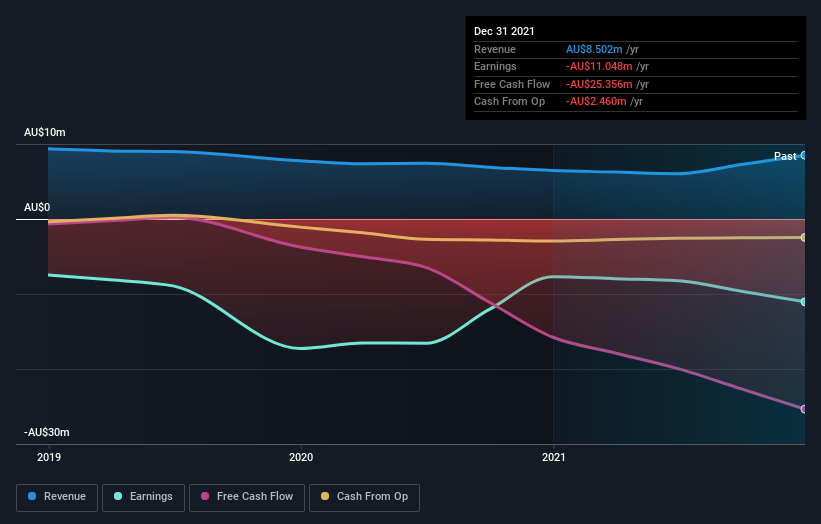Individual investors invested in Empire Energy Group Limited (ASX:EEG) copped the brunt of last week's AU$27m market cap decline
If you want to know who really controls Empire Energy Group Limited (ASX:EEG), then you'll have to look at the makeup of its share registry. With 52% stake, individual investors possess the maximum shares in the company. Put another way, the group faces the maximum upside potential (or downside risk).
While insiders, who own 25% shares weren’t spared from last week’s AU$27m market cap drop, individual investors as a group suffered the maximum losses
Let's take a closer look to see what the different types of shareholders can tell us about Empire Energy Group.
See our latest analysis for Empire Energy Group
What Does The Institutional Ownership Tell Us About Empire Energy Group?
Many institutions measure their performance against an index that approximates the local market. So they usually pay more attention to companies that are included in major indices.
As you can see, institutional investors have a fair amount of stake in Empire Energy Group. This suggests some credibility amongst professional investors. But we can't rely on that fact alone since institutions make bad investments sometimes, just like everyone does. When multiple institutions own a stock, there's always a risk that they are in a 'crowded trade'. When such a trade goes wrong, multiple parties may compete to sell stock fast. This risk is higher in a company without a history of growth. You can see Empire Energy Group's historic earnings and revenue below, but keep in mind there's always more to the story.
Hedge funds don't have many shares in Empire Energy Group. Paul Fudge is currently the company's largest shareholder with 18% of shares outstanding. Elphinstone Holdings Pty Ltd. is the second largest shareholder owning 6.7% of common stock, and Global Energy and Resources Development Limited holds about 4.2% of the company stock.
A deeper look at our ownership data shows that the top 22 shareholders collectively hold less than half of the register, suggesting a large group of small holders where no single shareholder has a majority.
While it makes sense to study institutional ownership data for a company, it also makes sense to study analyst sentiments to know which way the wind is blowing. As far as we can tell there isn't analyst coverage of the company, so it is probably flying under the radar.
Insider Ownership Of Empire Energy Group
While the precise definition of an insider can be subjective, almost everyone considers board members to be insiders. The company management answer to the board and the latter should represent the interests of shareholders. Notably, sometimes top-level managers are on the board themselves.
I generally consider insider ownership to be a good thing. However, on some occasions it makes it more difficult for other shareholders to hold the board accountable for decisions.
Our information suggests that insiders maintain a significant holding in Empire Energy Group Limited. Insiders have a AU$48m stake in this AU$197m business. We would say this shows alignment with shareholders, but it is worth noting that the company is still quite small; some insiders may have founded the business. You can click here to see if those insiders have been buying or selling.
General Public Ownership
The general public, mostly comprising of individual investors, collectively holds 52% of Empire Energy Group shares. With this amount of ownership, retail investors can collectively play a role in decisions that affect shareholder returns, such as dividend policies and the appointment of directors. They can also exercise the power to vote on acquisitions or mergers that may not improve profitability.
Private Company Ownership
We can see that Private Companies own 16%, of the shares on issue. Private companies may be related parties. Sometimes insiders have an interest in a public company through a holding in a private company, rather than in their own capacity as an individual. While it's hard to draw any broad stroke conclusions, it is worth noting as an area for further research.
Next Steps:
It's always worth thinking about the different groups who own shares in a company. But to understand Empire Energy Group better, we need to consider many other factors. Be aware that Empire Energy Group is showing 2 warning signs in our investment analysis , and 1 of those doesn't sit too well with us...
Of course this may not be the best stock to buy. So take a peek at this free free list of interesting companies.
NB: Figures in this article are calculated using data from the last twelve months, which refer to the 12-month period ending on the last date of the month the financial statement is dated. This may not be consistent with full year annual report figures.
Have feedback on this article? Concerned about the content? Get in touch with us directly. Alternatively, email editorial-team (at) simplywallst.com.
This article by Simply Wall St is general in nature. We provide commentary based on historical data and analyst forecasts only using an unbiased methodology and our articles are not intended to be financial advice. It does not constitute a recommendation to buy or sell any stock, and does not take account of your objectives, or your financial situation. We aim to bring you long-term focused analysis driven by fundamental data. Note that our analysis may not factor in the latest price-sensitive company announcements or qualitative material. Simply Wall St has no position in any stocks mentioned.
Join A Paid User Research Session
You’ll receive a US$30 Amazon Gift card for 1 hour of your time while helping us build better investing tools for the individual investors like yourself. Sign up here


